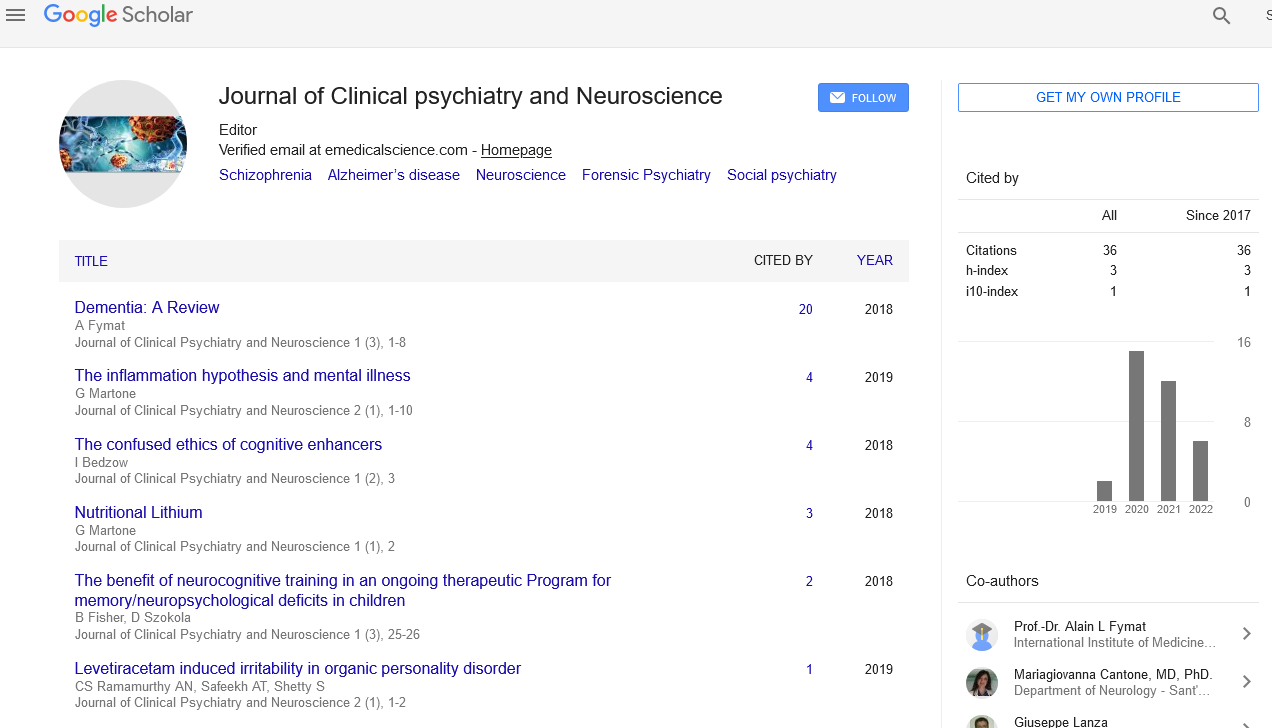Different domains of functioning in major depressive disorder are predicted by specific neurocognition and depressive symptoms
Received: 02-Mar-2023, Manuscript No. puljcpn-23-6395; Editor assigned: 04-Mar-2023, Pre QC No. puljcpn-23-6395 (PQ); Accepted Date: Apr 16, 2023; Reviewed: 10-Mar-2023 QC No. puljcpn-23-6395 (Q); Revised: 14-Mar-2023, Manuscript No. puljcpn-23-6395 (R); Published: 27-Apr-2023, DOI: 10.37532/ puljcpn.2023.6(2).99-100
Citation: Nortan R. Different domains of functioning in major depressive disorder are predicted by specific neurocognition and depressive symptoms. J Clin Psychiatry Neurosci. 2023; 6(2):99-100.
This open-access article is distributed under the terms of the Creative Commons Attribution Non-Commercial License (CC BY-NC) (http://creativecommons.org/licenses/by-nc/4.0/), which permits reuse, distribution and reproduction of the article, provided that the original work is properly cited and the reuse is restricted to noncommercial purposes. For commercial reuse, contact reprints@pulsus.com
Abstract
Although depressive symptoms have been linked independently to cognition and functioning in depression, little is known about the function of mediators in this relationship. We looked at how two aspects of everyday functioning in people with Major Depressive Disorder (MDD) are predicted by neurocognitive ability, the severity of depressive symptoms, dysfunctional attitudes, and functional capacity
Key Words
Mediators; Depressive Symptoms; Cognition
Introduction
Modelling the independent and mediated impacts of factors on two areas of functioning—social (relationships and social engagement) and productive (household and community activities)— was done using confirmatory path analyses. Functional attitudes influenced each of these associations between cognition and depressed symptoms, which both predicted productive performance. A key mediator in the connection between neurocognition and effective functioning was functional competence. With no meaningful mediators, depressive symptoms and cognition were independent predictors of social functioning.
Divergent routes lead to many aspects of daily functioning in MDD. The examination of various degrees of anticipating productive activities and closer linkages with social consequences are examples of measurement implications. If other paths to functioning are not addressed, treatments that specifically target depressed symptoms and cognition may not lead to gains in daily functioning.
In severe mental illnesses like schizophrenia and bipolar disorder, the links between cognitive deficits and impaired daily functioning have been established. Research that has been successfully reproduced suggests that serious depression may be mediated by factors including functional capacity and mood symptoms in addition to the direct impact of cognition on daily functioning. Major depression patients still struggle with social functioning (such as keeping friendships and getting along with others) and productive activities (such as managing domestic responsibilities) even after their depressed symptoms have subsided. Other disorders have demonstrated distinctive functional outcomes with different predictors, and cognition has been investigated as both the content of thought (such as dysfunctional attitudes and beliefs about oneself) and the processes of thought (such as neurocognitive abilities in domains like memory, attention, and executive function).
Since cognitive dysfunction has a significant impact on depressive psychopathology, cognitive impairments (such as decreased concentration and indecision) are included in the diagnostic criteria for MDD. The role of putative mediators of the correlation between cognition and functioning in this group has not been described in research to date looking at the mechanisms of functional impairment in unipolar depression; instead, they have only looked at bivariate associations with cognition. There is widespread agreement that cognitive deficits play a significant role in MDD. In comparison to healthy controls, meta-analyses of cognitive abnormalities in MDD show persistent and repeatable impairment on the order of a modest to medium effect size. Currently, it has been discovered that when compared to healthy controls, depressed individuals exhibit statistically significant cognitive abnormalities of a moderate level of severity. Additionally, cognitive deficits do not disappear with motivation or other depressive symptoms; rather, they continue even after remission, with up to 50% of depressed patients still displaying cognitive impairment. In a recent meta-analysis, it was discovered that after a severe depressive episode has subsided, cognitive abnormalities continue with a modest to medium impact size. These findings demonstrate how widespread and persistent cognitive abnormalities are in depressed people. In populations with severe mental illness, such as schizophrenia, bipolar disorder, and depression, cognitive functioning has been shown to be a significant predictor of everyday functional skills and outcomes. Using statistical modelling, recent research offers a basic knowledge of the direct and mediated impacts of cognition on functioning in schizophrenia and bipolar illness. Measures of functional competence—the capacity to carry out daily living activities in a neutral setting, as determined by objective, performance-based role plays —have been shown to at least partially moderate the relationship between cognition and functioning in both schizophrenia and bipolar illness. Contrarily, clinical symptoms have a direct impact on real-world functioning even if they are mainly unrelated to cognitive or functional skills.
Little is known about the function of other mediators in this relationship, despite previous studies looking at the independent relationships between depressive symptoms and cognition and functioning in depression. Although dysfunctional attitudes are a hallmark of depression, their mediating impact on the connection between cognition and daily functioning in depression has not yet been investigated. Higher levels of dysfunctional attitudes have been linked to decrease daily functioning, more cognitive impairment, and worse social and occupational performance in schizophrenia. Furthermore, it has been demonstrated that dysfunctional attitudes in schizophrenia mediate the link between cognition and daily functioning. Functional recovery in MDD may benefit greatly from current therapies that focus on cognition and functional abilities, such as cognitive remediation. Because this pathway seems to be mediated by attitudes and functional capacity, the findings from our study specifically suggest that cognitive remediation programmers that solely emphasize restorative techniques with drill and practice may result in proximal improvements in cognition but may have fewer distal implications for improvements in daily functioning. The findings of this study also imply that in order to get the optimum functional benefits, these behavioral interventions may also need to tackle depressed cognitions.





